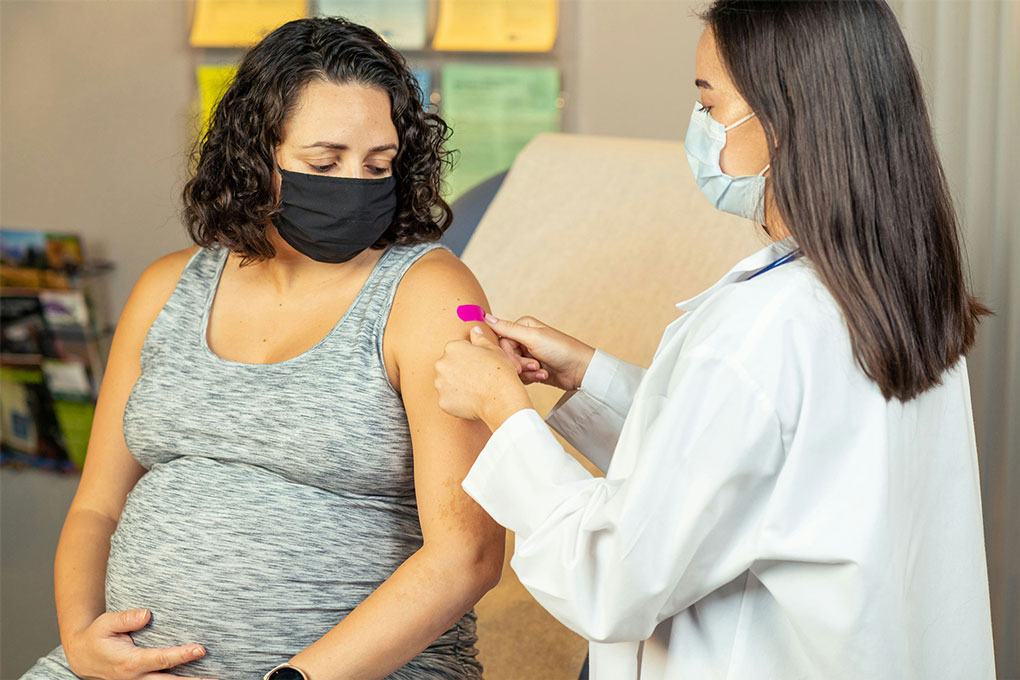Measles and pregnancy: 5 things doctors urgently want you to know
Canadian measles experts are warning of the serious risks to pregnant people and newborns posed by rising rates of this extremely contagious disease.
- 13 June 2025
- 4 min read
- by Linda Geddes

Doctors working directly with measles outbreaks in Canada have released a paper summarising the key information that pregnant people and their doctors should know about the disease and how to stay safe.
Their intervention comes as the country grapples with its first death from measles this year – the infant having contracted it before birth from their mother, who hadn’t been vaccinated against the disease. A further six babies with unvaccinated mothers have also been born with measles in the Canadian province of Ontario since late last year, Ontario’s chief medical officer announced this week.
Measles bounceback
Like many countries, Canada has seen a recent increase in measles cases, with more reported during the first two months of 2025 than in the whole of 2024. Ontario is at the epicentre of that outbreak, with more than 2,000 cases reported since October.Falling vaccination rates are thought to be to blame.
Writing in the Canadian Medical Association Journal, doctors stressed that ensuring everyone of reproductive age is up to date with measles vaccinations is the best way of preventing complications during pregnancy and in newborn babies.
“Acquiring the measles virus during pregnancy can have devastating and far-reaching impacts on a birthing parent and their unborn child,” said co-author Dr Michelle Barton, a paediatrician at the Children's Hospital at London Health Sciences Centre in Ontario, Canada. “It can be quite serious, with some babies experiencing complications either immediately or several years later. We hope this article raises awareness about the potential harms it poses.”
Here are the five key things they’d like people to know about the risks of measles to pregnant people and their babies.
- Measles hits harder in pregnancy – and can be fatal
Measles isn’t only a childhood illness. If you catch it during pregnancy, you’re at much higher risk of pneumonia, hepatitis, hospitalisation – and have a tenfold greater risk of death, compared to people who are not pregnant. There’s also a greater risk of miscarriage, premature birth and babies not growing as they should.
- A treatment exists – but the window for receiving it is short
People who have been exposed to measles can be treated with intravenous immunoglobulin – a concentrated solution of antibodies taken from the blood of many healthy donors – to help reduce the risk of infection or lessen its severity. However, this needs to be given within six days of exposure. This treatment is also recommended for people who’ve only had one MMR shot or whose vaccination history is unclear. “Preterm labour should be considered a potential sign of infection in exposed, susceptible pregnant individuals,” Barton and colleagues said.
- Hospitals should take special precautions
Measles is one of the world’s most contagious viruses, with one infected person able to infect as many as 18 others. It is also airborne, which means that if you’re pregnant and admitted to hospital, strict infection control is vital – for everyone’s health. Infectious disease specialists should be consulted when either a pregnant patient or their baby has measles, and infection control measures closely followed throughout their infectious period.
- Catching measles near your due date can seriously harm your baby
Congenital measles occurs when a baby catches the infection before birth. It usually manifests within the first ten days of life and can present with fever, rash, inflamed liver (hepatitis) and pneumonia (a lung infection). In some cases, it can result in serious complications, including a rare, progressive and usually fatal brain disorder called subacute sclerosing panencephalitis. The risk of congenital measles is greatest if a mother catches measles within two weeks of giving birth.
- Prevention is simple: check your vaccination status
This is the message the doctors most want to drive home: people of reproductive age should check whether they are up to date with all their measles vaccinations and offered additional shots where necessary.
Have you read?
“Pregnant people do not have the same opportunity to protect themselves against infection as those who are not pregnant, since measles-containing vaccines are generally contraindicated in pregnancy because of theoretical risk to the foetus,” said Dr Catherine Varner, CMAJ’s deputy editor and an emergency medicine physician, in an accompanying editorial. “Thus, people who are pregnant and unvaccinated or those who have received only 1 vaccine for measles are particularly burdened during outbreaks.” To reduce this risk, “clinicians should ask patients who are contemplating pregnancy whether they have had 2 measles vaccinations.”
She added: “Pregnant people are often at higher risk than the general population in infectious disease outbreaks. As such, they cannot be an afterthought in preventive strategies and health care systems’ responses.”







